NUR 222 Assignment: Ethical and Legal Issues in Nursing Practice
VerifiedAdded on 2022/10/09
|11
|3139
|16
Report
AI Summary
This report examines ethical and legal issues in nursing practice through the analysis of three case studies. The assignment delves into the application of relevant legislation, professional codes of conduct, and practice standards to each scenario, addressing ethical dilemmas faced by nurses and midwives. The legal and ethical implications of decisions made in each case are thoroughly discussed, referencing the Anti-Discrimination Act 1991, the Code of Conduct for Nurses 2018, the Health Ombudsman Act 2013, and the Work Health and Safety Act 2011, among others. The report also includes a reflection on a personal experience, highlighting the importance of patient privacy, informed consent, and ethical decision-making in nursing. The student nurse's actions in each case are evaluated against the principles of the nursing code of ethics and relevant legal frameworks, with a focus on the responsibilities of healthcare professionals in maintaining patient safety, promoting ethical conduct, and adhering to legal requirements. The facilitator's role is also discussed in the context of professional misconduct and the need for intervention when nurses are unable to perform their duties safely.
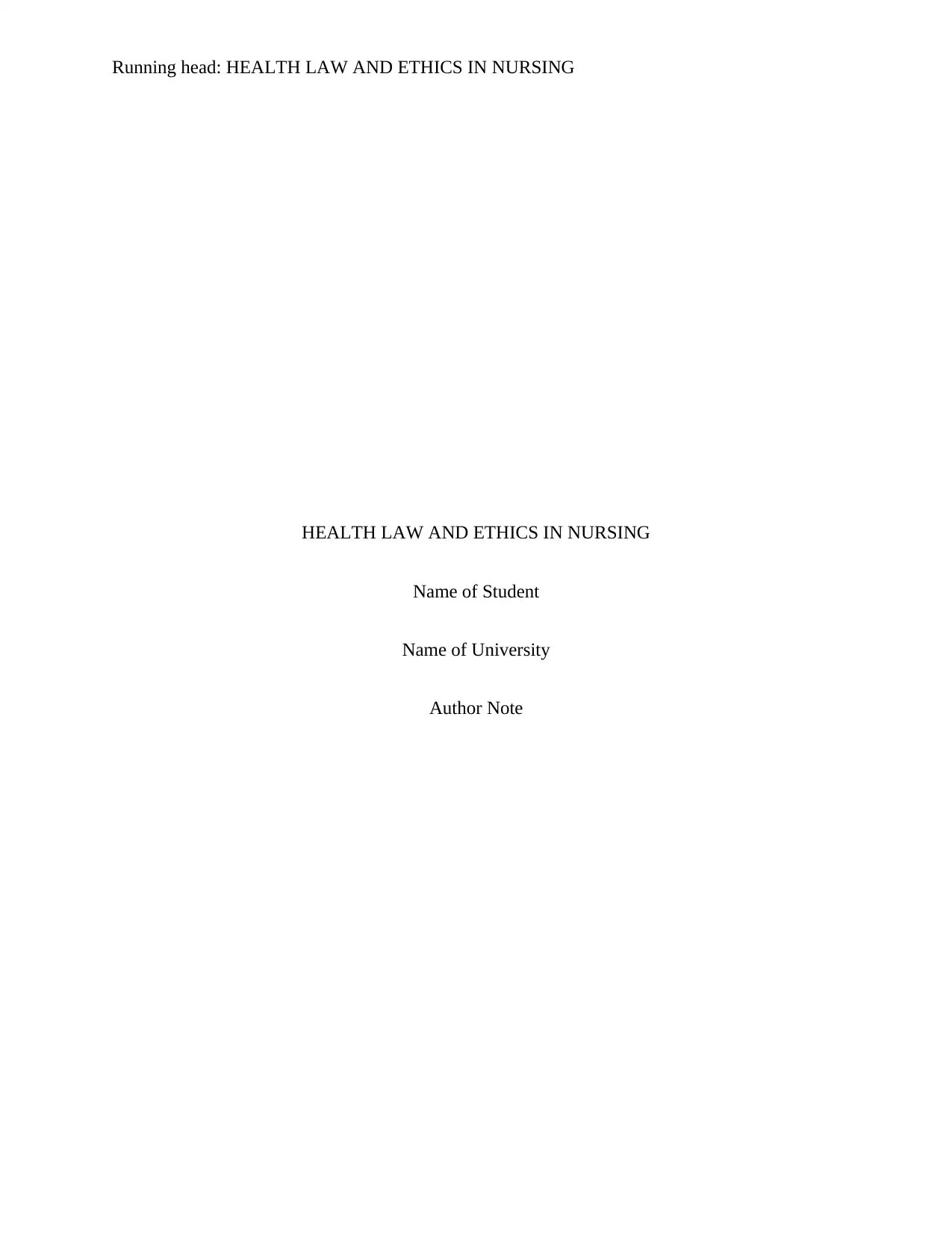
Running head: HEALTH LAW AND ETHICS IN NURSING
HEALTH LAW AND ETHICS IN NURSING
Name of Student
Name of University
Author Note
HEALTH LAW AND ETHICS IN NURSING
Name of Student
Name of University
Author Note
Paraphrase This Document
Need a fresh take? Get an instant paraphrase of this document with our AI Paraphraser
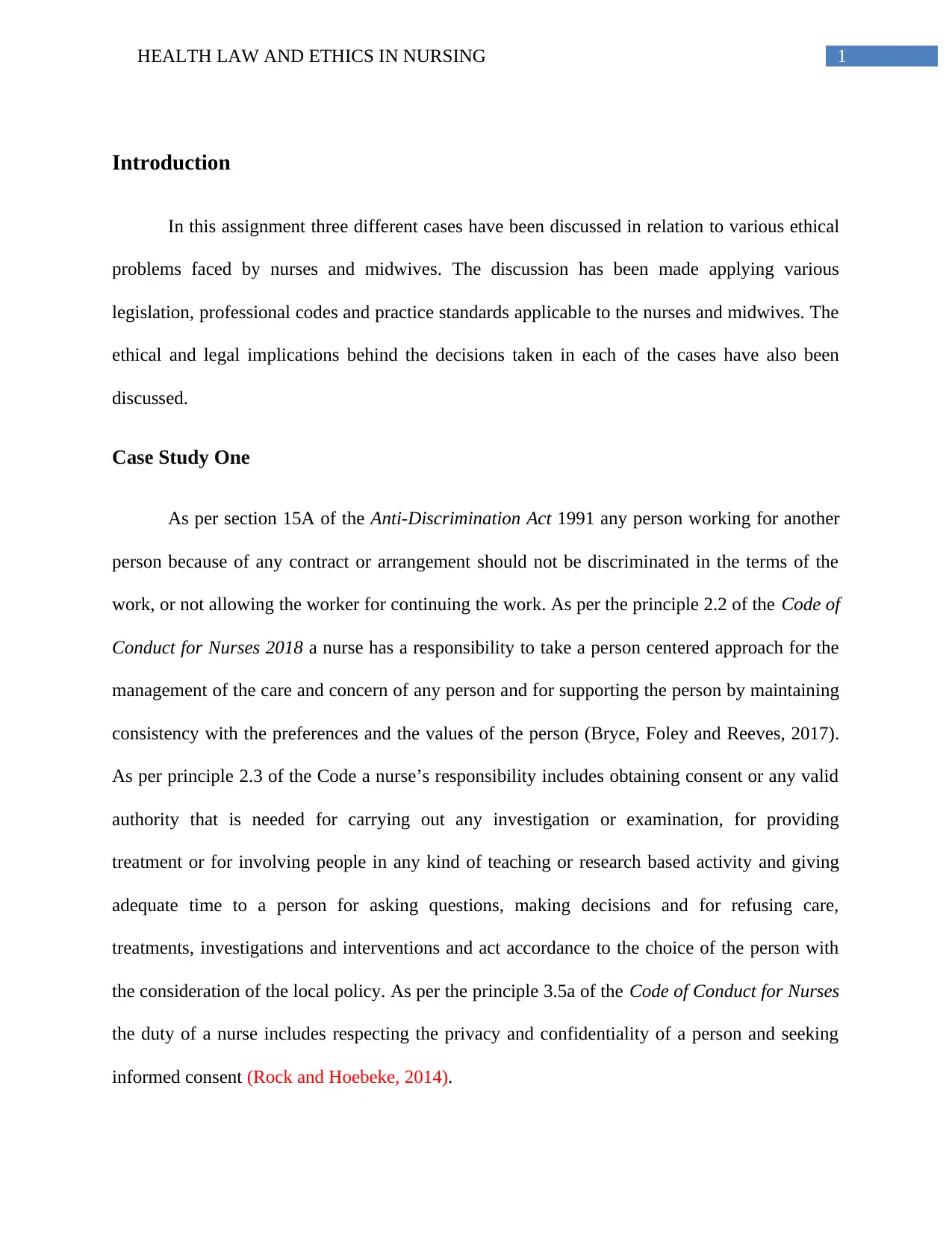
1HEALTH LAW AND ETHICS IN NURSING
Introduction
In this assignment three different cases have been discussed in relation to various ethical
problems faced by nurses and midwives. The discussion has been made applying various
legislation, professional codes and practice standards applicable to the nurses and midwives. The
ethical and legal implications behind the decisions taken in each of the cases have also been
discussed.
Case Study One
As per section 15A of the Anti-Discrimination Act 1991 any person working for another
person because of any contract or arrangement should not be discriminated in the terms of the
work, or not allowing the worker for continuing the work. As per the principle 2.2 of the Code of
Conduct for Nurses 2018 a nurse has a responsibility to take a person centered approach for the
management of the care and concern of any person and for supporting the person by maintaining
consistency with the preferences and the values of the person (Bryce, Foley and Reeves, 2017).
As per principle 2.3 of the Code a nurse’s responsibility includes obtaining consent or any valid
authority that is needed for carrying out any investigation or examination, for providing
treatment or for involving people in any kind of teaching or research based activity and giving
adequate time to a person for asking questions, making decisions and for refusing care,
treatments, investigations and interventions and act accordance to the choice of the person with
the consideration of the local policy. As per the principle 3.5a of the Code of Conduct for Nurses
the duty of a nurse includes respecting the privacy and confidentiality of a person and seeking
informed consent (Rock and Hoebeke, 2014).
Introduction
In this assignment three different cases have been discussed in relation to various ethical
problems faced by nurses and midwives. The discussion has been made applying various
legislation, professional codes and practice standards applicable to the nurses and midwives. The
ethical and legal implications behind the decisions taken in each of the cases have also been
discussed.
Case Study One
As per section 15A of the Anti-Discrimination Act 1991 any person working for another
person because of any contract or arrangement should not be discriminated in the terms of the
work, or not allowing the worker for continuing the work. As per the principle 2.2 of the Code of
Conduct for Nurses 2018 a nurse has a responsibility to take a person centered approach for the
management of the care and concern of any person and for supporting the person by maintaining
consistency with the preferences and the values of the person (Bryce, Foley and Reeves, 2017).
As per principle 2.3 of the Code a nurse’s responsibility includes obtaining consent or any valid
authority that is needed for carrying out any investigation or examination, for providing
treatment or for involving people in any kind of teaching or research based activity and giving
adequate time to a person for asking questions, making decisions and for refusing care,
treatments, investigations and interventions and act accordance to the choice of the person with
the consideration of the local policy. As per the principle 3.5a of the Code of Conduct for Nurses
the duty of a nurse includes respecting the privacy and confidentiality of a person and seeking
informed consent (Rock and Hoebeke, 2014).
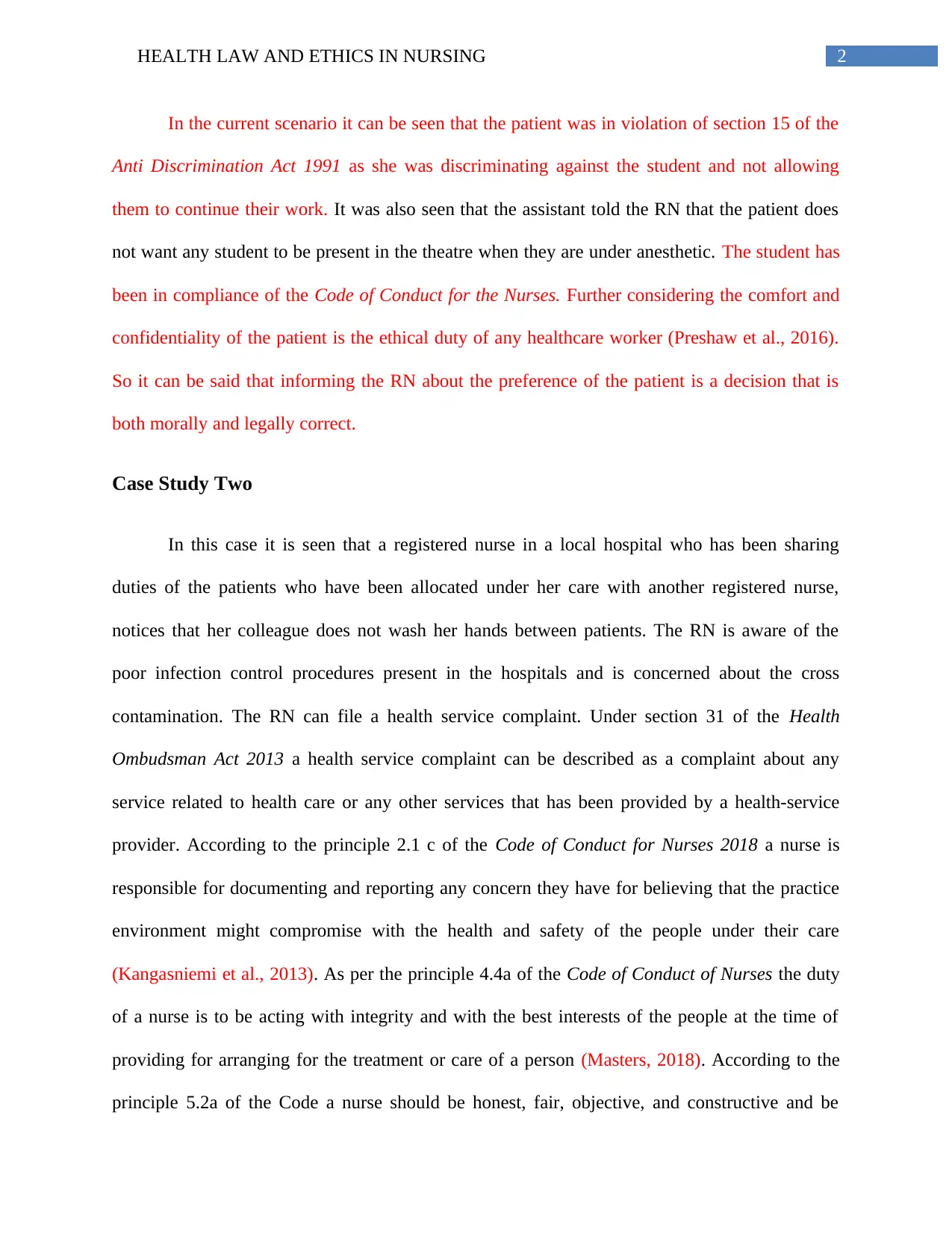
2HEALTH LAW AND ETHICS IN NURSING
In the current scenario it can be seen that the patient was in violation of section 15 of the
Anti Discrimination Act 1991 as she was discriminating against the student and not allowing
them to continue their work. It was also seen that the assistant told the RN that the patient does
not want any student to be present in the theatre when they are under anesthetic. The student has
been in compliance of the Code of Conduct for the Nurses. Further considering the comfort and
confidentiality of the patient is the ethical duty of any healthcare worker (Preshaw et al., 2016).
So it can be said that informing the RN about the preference of the patient is a decision that is
both morally and legally correct.
Case Study Two
In this case it is seen that a registered nurse in a local hospital who has been sharing
duties of the patients who have been allocated under her care with another registered nurse,
notices that her colleague does not wash her hands between patients. The RN is aware of the
poor infection control procedures present in the hospitals and is concerned about the cross
contamination. The RN can file a health service complaint. Under section 31 of the Health
Ombudsman Act 2013 a health service complaint can be described as a complaint about any
service related to health care or any other services that has been provided by a health-service
provider. According to the principle 2.1 c of the Code of Conduct for Nurses 2018 a nurse is
responsible for documenting and reporting any concern they have for believing that the practice
environment might compromise with the health and safety of the people under their care
(Kangasniemi et al., 2013). As per the principle 4.4a of the Code of Conduct of Nurses the duty
of a nurse is to be acting with integrity and with the best interests of the people at the time of
providing for arranging for the treatment or care of a person (Masters, 2018). According to the
principle 5.2a of the Code a nurse should be honest, fair, objective, and constructive and be
In the current scenario it can be seen that the patient was in violation of section 15 of the
Anti Discrimination Act 1991 as she was discriminating against the student and not allowing
them to continue their work. It was also seen that the assistant told the RN that the patient does
not want any student to be present in the theatre when they are under anesthetic. The student has
been in compliance of the Code of Conduct for the Nurses. Further considering the comfort and
confidentiality of the patient is the ethical duty of any healthcare worker (Preshaw et al., 2016).
So it can be said that informing the RN about the preference of the patient is a decision that is
both morally and legally correct.
Case Study Two
In this case it is seen that a registered nurse in a local hospital who has been sharing
duties of the patients who have been allocated under her care with another registered nurse,
notices that her colleague does not wash her hands between patients. The RN is aware of the
poor infection control procedures present in the hospitals and is concerned about the cross
contamination. The RN can file a health service complaint. Under section 31 of the Health
Ombudsman Act 2013 a health service complaint can be described as a complaint about any
service related to health care or any other services that has been provided by a health-service
provider. According to the principle 2.1 c of the Code of Conduct for Nurses 2018 a nurse is
responsible for documenting and reporting any concern they have for believing that the practice
environment might compromise with the health and safety of the people under their care
(Kangasniemi et al., 2013). As per the principle 4.4a of the Code of Conduct of Nurses the duty
of a nurse is to be acting with integrity and with the best interests of the people at the time of
providing for arranging for the treatment or care of a person (Masters, 2018). According to the
principle 5.2a of the Code a nurse should be honest, fair, objective, and constructive and be
⊘ This is a preview!⊘
Do you want full access?
Subscribe today to unlock all pages.

Trusted by 1+ million students worldwide
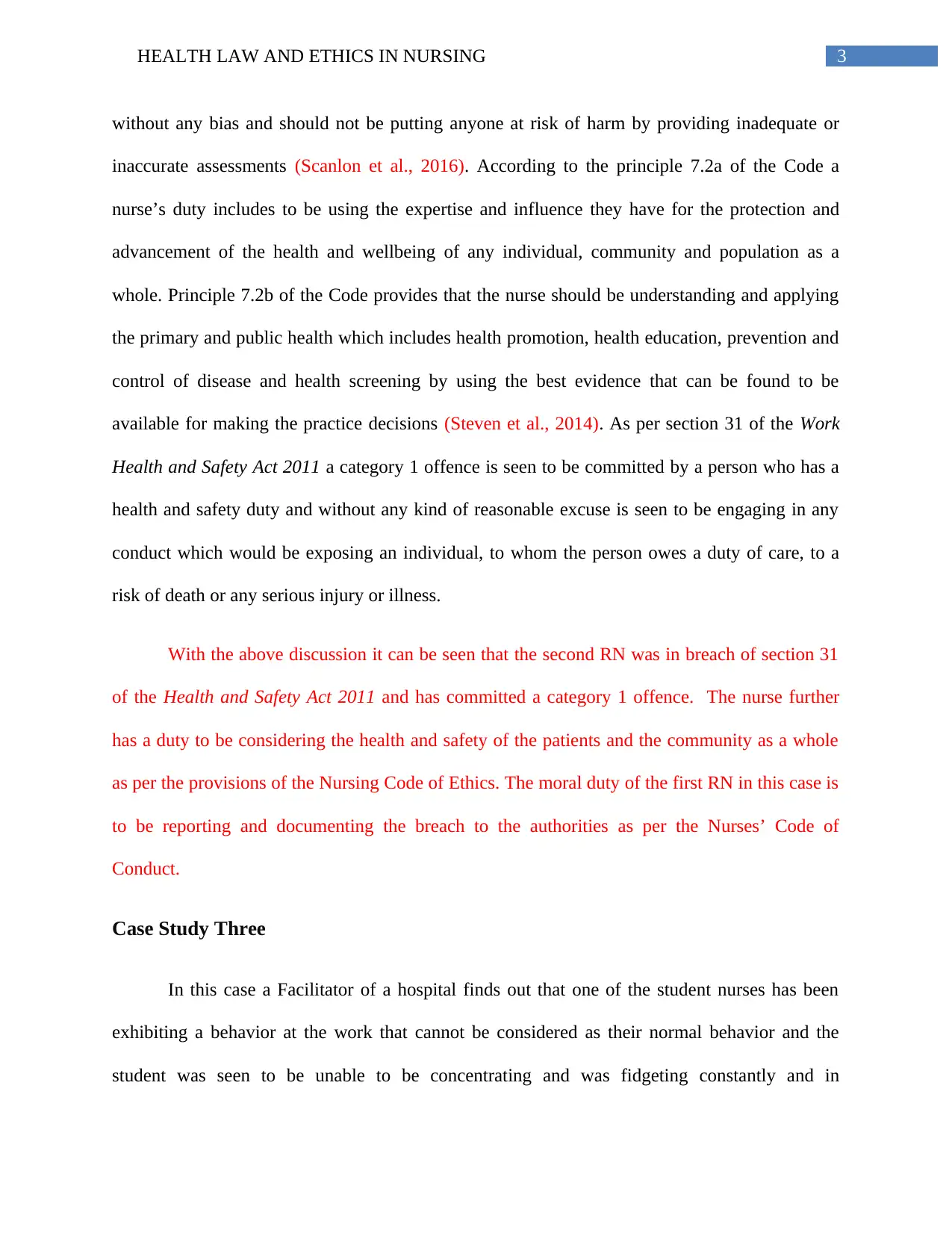
3HEALTH LAW AND ETHICS IN NURSING
without any bias and should not be putting anyone at risk of harm by providing inadequate or
inaccurate assessments (Scanlon et al., 2016). According to the principle 7.2a of the Code a
nurse’s duty includes to be using the expertise and influence they have for the protection and
advancement of the health and wellbeing of any individual, community and population as a
whole. Principle 7.2b of the Code provides that the nurse should be understanding and applying
the primary and public health which includes health promotion, health education, prevention and
control of disease and health screening by using the best evidence that can be found to be
available for making the practice decisions (Steven et al., 2014). As per section 31 of the Work
Health and Safety Act 2011 a category 1 offence is seen to be committed by a person who has a
health and safety duty and without any kind of reasonable excuse is seen to be engaging in any
conduct which would be exposing an individual, to whom the person owes a duty of care, to a
risk of death or any serious injury or illness.
With the above discussion it can be seen that the second RN was in breach of section 31
of the Health and Safety Act 2011 and has committed a category 1 offence. The nurse further
has a duty to be considering the health and safety of the patients and the community as a whole
as per the provisions of the Nursing Code of Ethics. The moral duty of the first RN in this case is
to be reporting and documenting the breach to the authorities as per the Nurses’ Code of
Conduct.
Case Study Three
In this case a Facilitator of a hospital finds out that one of the student nurses has been
exhibiting a behavior at the work that cannot be considered as their normal behavior and the
student was seen to be unable to be concentrating and was fidgeting constantly and in
without any bias and should not be putting anyone at risk of harm by providing inadequate or
inaccurate assessments (Scanlon et al., 2016). According to the principle 7.2a of the Code a
nurse’s duty includes to be using the expertise and influence they have for the protection and
advancement of the health and wellbeing of any individual, community and population as a
whole. Principle 7.2b of the Code provides that the nurse should be understanding and applying
the primary and public health which includes health promotion, health education, prevention and
control of disease and health screening by using the best evidence that can be found to be
available for making the practice decisions (Steven et al., 2014). As per section 31 of the Work
Health and Safety Act 2011 a category 1 offence is seen to be committed by a person who has a
health and safety duty and without any kind of reasonable excuse is seen to be engaging in any
conduct which would be exposing an individual, to whom the person owes a duty of care, to a
risk of death or any serious injury or illness.
With the above discussion it can be seen that the second RN was in breach of section 31
of the Health and Safety Act 2011 and has committed a category 1 offence. The nurse further
has a duty to be considering the health and safety of the patients and the community as a whole
as per the provisions of the Nursing Code of Ethics. The moral duty of the first RN in this case is
to be reporting and documenting the breach to the authorities as per the Nurses’ Code of
Conduct.
Case Study Three
In this case a Facilitator of a hospital finds out that one of the student nurses has been
exhibiting a behavior at the work that cannot be considered as their normal behavior and the
student was seen to be unable to be concentrating and was fidgeting constantly and in
Paraphrase This Document
Need a fresh take? Get an instant paraphrase of this document with our AI Paraphraser
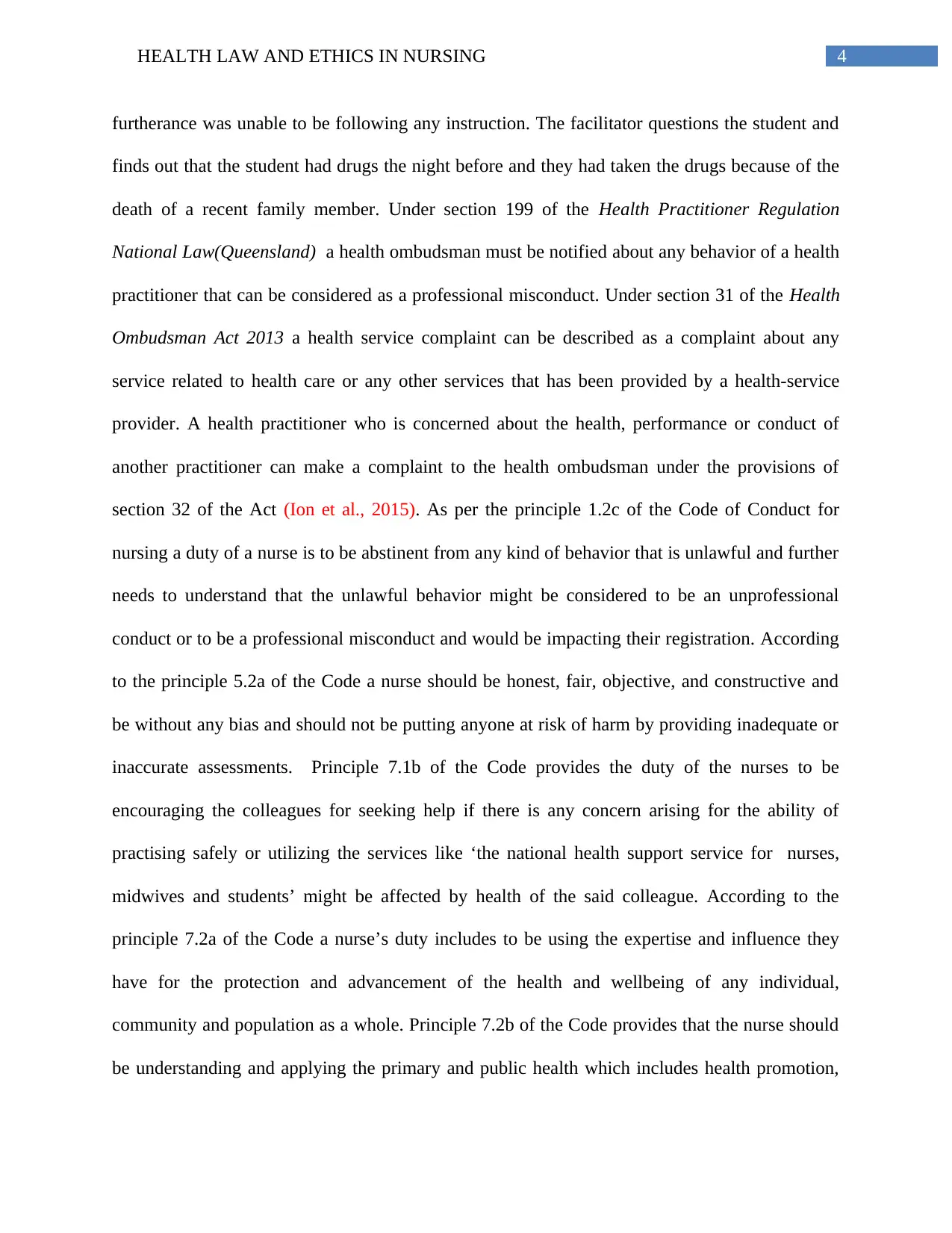
4HEALTH LAW AND ETHICS IN NURSING
furtherance was unable to be following any instruction. The facilitator questions the student and
finds out that the student had drugs the night before and they had taken the drugs because of the
death of a recent family member. Under section 199 of the Health Practitioner Regulation
National Law(Queensland) a health ombudsman must be notified about any behavior of a health
practitioner that can be considered as a professional misconduct. Under section 31 of the Health
Ombudsman Act 2013 a health service complaint can be described as a complaint about any
service related to health care or any other services that has been provided by a health-service
provider. A health practitioner who is concerned about the health, performance or conduct of
another practitioner can make a complaint to the health ombudsman under the provisions of
section 32 of the Act (Ion et al., 2015). As per the principle 1.2c of the Code of Conduct for
nursing a duty of a nurse is to be abstinent from any kind of behavior that is unlawful and further
needs to understand that the unlawful behavior might be considered to be an unprofessional
conduct or to be a professional misconduct and would be impacting their registration. According
to the principle 5.2a of the Code a nurse should be honest, fair, objective, and constructive and
be without any bias and should not be putting anyone at risk of harm by providing inadequate or
inaccurate assessments. Principle 7.1b of the Code provides the duty of the nurses to be
encouraging the colleagues for seeking help if there is any concern arising for the ability of
practising safely or utilizing the services like ‘the national health support service for nurses,
midwives and students’ might be affected by health of the said colleague. According to the
principle 7.2a of the Code a nurse’s duty includes to be using the expertise and influence they
have for the protection and advancement of the health and wellbeing of any individual,
community and population as a whole. Principle 7.2b of the Code provides that the nurse should
be understanding and applying the primary and public health which includes health promotion,
furtherance was unable to be following any instruction. The facilitator questions the student and
finds out that the student had drugs the night before and they had taken the drugs because of the
death of a recent family member. Under section 199 of the Health Practitioner Regulation
National Law(Queensland) a health ombudsman must be notified about any behavior of a health
practitioner that can be considered as a professional misconduct. Under section 31 of the Health
Ombudsman Act 2013 a health service complaint can be described as a complaint about any
service related to health care or any other services that has been provided by a health-service
provider. A health practitioner who is concerned about the health, performance or conduct of
another practitioner can make a complaint to the health ombudsman under the provisions of
section 32 of the Act (Ion et al., 2015). As per the principle 1.2c of the Code of Conduct for
nursing a duty of a nurse is to be abstinent from any kind of behavior that is unlawful and further
needs to understand that the unlawful behavior might be considered to be an unprofessional
conduct or to be a professional misconduct and would be impacting their registration. According
to the principle 5.2a of the Code a nurse should be honest, fair, objective, and constructive and
be without any bias and should not be putting anyone at risk of harm by providing inadequate or
inaccurate assessments. Principle 7.1b of the Code provides the duty of the nurses to be
encouraging the colleagues for seeking help if there is any concern arising for the ability of
practising safely or utilizing the services like ‘the national health support service for nurses,
midwives and students’ might be affected by health of the said colleague. According to the
principle 7.2a of the Code a nurse’s duty includes to be using the expertise and influence they
have for the protection and advancement of the health and wellbeing of any individual,
community and population as a whole. Principle 7.2b of the Code provides that the nurse should
be understanding and applying the primary and public health which includes health promotion,
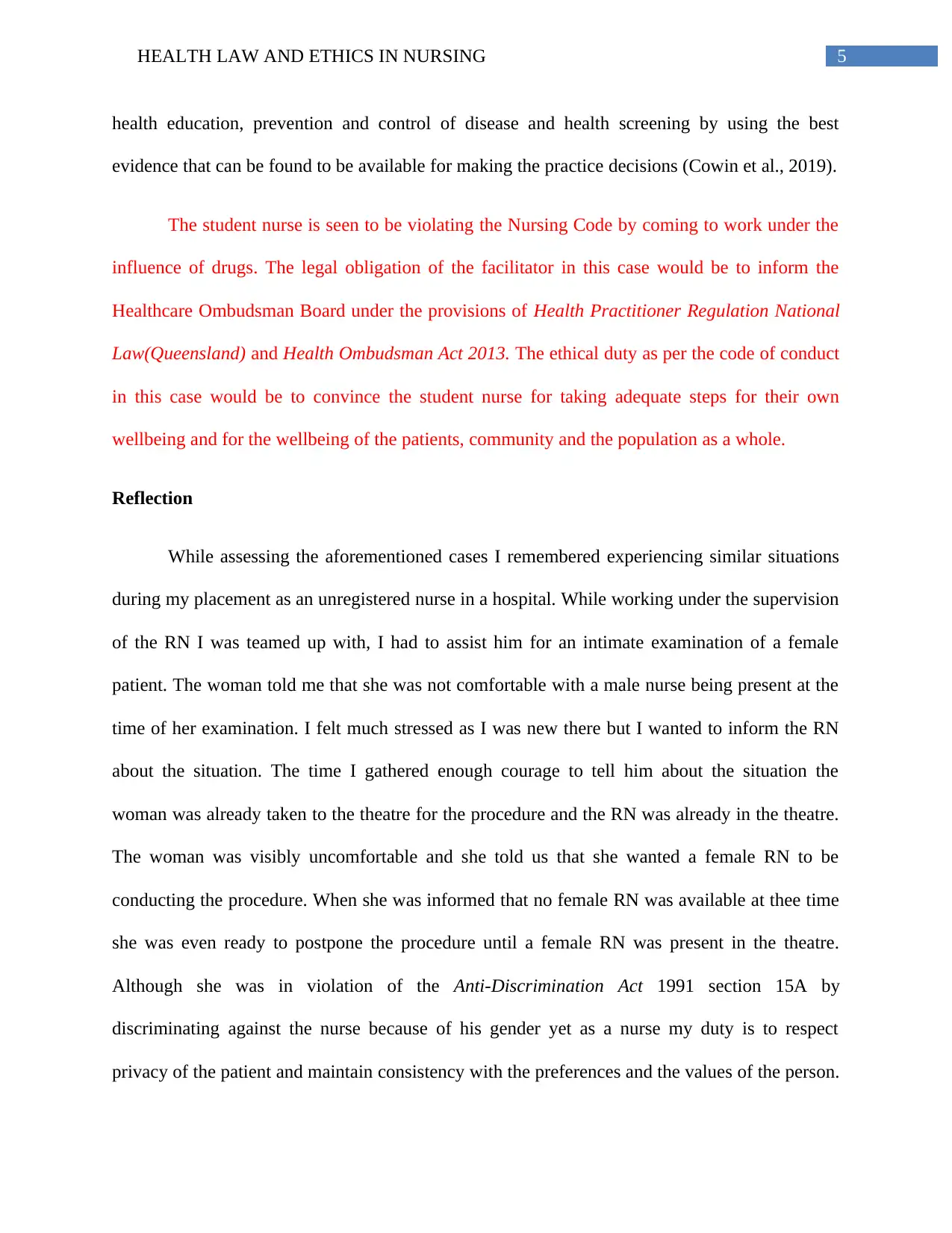
5HEALTH LAW AND ETHICS IN NURSING
health education, prevention and control of disease and health screening by using the best
evidence that can be found to be available for making the practice decisions (Cowin et al., 2019).
The student nurse is seen to be violating the Nursing Code by coming to work under the
influence of drugs. The legal obligation of the facilitator in this case would be to inform the
Healthcare Ombudsman Board under the provisions of Health Practitioner Regulation National
Law(Queensland) and Health Ombudsman Act 2013. The ethical duty as per the code of conduct
in this case would be to convince the student nurse for taking adequate steps for their own
wellbeing and for the wellbeing of the patients, community and the population as a whole.
Reflection
While assessing the aforementioned cases I remembered experiencing similar situations
during my placement as an unregistered nurse in a hospital. While working under the supervision
of the RN I was teamed up with, I had to assist him for an intimate examination of a female
patient. The woman told me that she was not comfortable with a male nurse being present at the
time of her examination. I felt much stressed as I was new there but I wanted to inform the RN
about the situation. The time I gathered enough courage to tell him about the situation the
woman was already taken to the theatre for the procedure and the RN was already in the theatre.
The woman was visibly uncomfortable and she told us that she wanted a female RN to be
conducting the procedure. When she was informed that no female RN was available at thee time
she was even ready to postpone the procedure until a female RN was present in the theatre.
Although she was in violation of the Anti-Discrimination Act 1991 section 15A by
discriminating against the nurse because of his gender yet as a nurse my duty is to respect
privacy of the patient and maintain consistency with the preferences and the values of the person.
health education, prevention and control of disease and health screening by using the best
evidence that can be found to be available for making the practice decisions (Cowin et al., 2019).
The student nurse is seen to be violating the Nursing Code by coming to work under the
influence of drugs. The legal obligation of the facilitator in this case would be to inform the
Healthcare Ombudsman Board under the provisions of Health Practitioner Regulation National
Law(Queensland) and Health Ombudsman Act 2013. The ethical duty as per the code of conduct
in this case would be to convince the student nurse for taking adequate steps for their own
wellbeing and for the wellbeing of the patients, community and the population as a whole.
Reflection
While assessing the aforementioned cases I remembered experiencing similar situations
during my placement as an unregistered nurse in a hospital. While working under the supervision
of the RN I was teamed up with, I had to assist him for an intimate examination of a female
patient. The woman told me that she was not comfortable with a male nurse being present at the
time of her examination. I felt much stressed as I was new there but I wanted to inform the RN
about the situation. The time I gathered enough courage to tell him about the situation the
woman was already taken to the theatre for the procedure and the RN was already in the theatre.
The woman was visibly uncomfortable and she told us that she wanted a female RN to be
conducting the procedure. When she was informed that no female RN was available at thee time
she was even ready to postpone the procedure until a female RN was present in the theatre.
Although she was in violation of the Anti-Discrimination Act 1991 section 15A by
discriminating against the nurse because of his gender yet as a nurse my duty is to respect
privacy of the patient and maintain consistency with the preferences and the values of the person.
⊘ This is a preview!⊘
Do you want full access?
Subscribe today to unlock all pages.

Trusted by 1+ million students worldwide
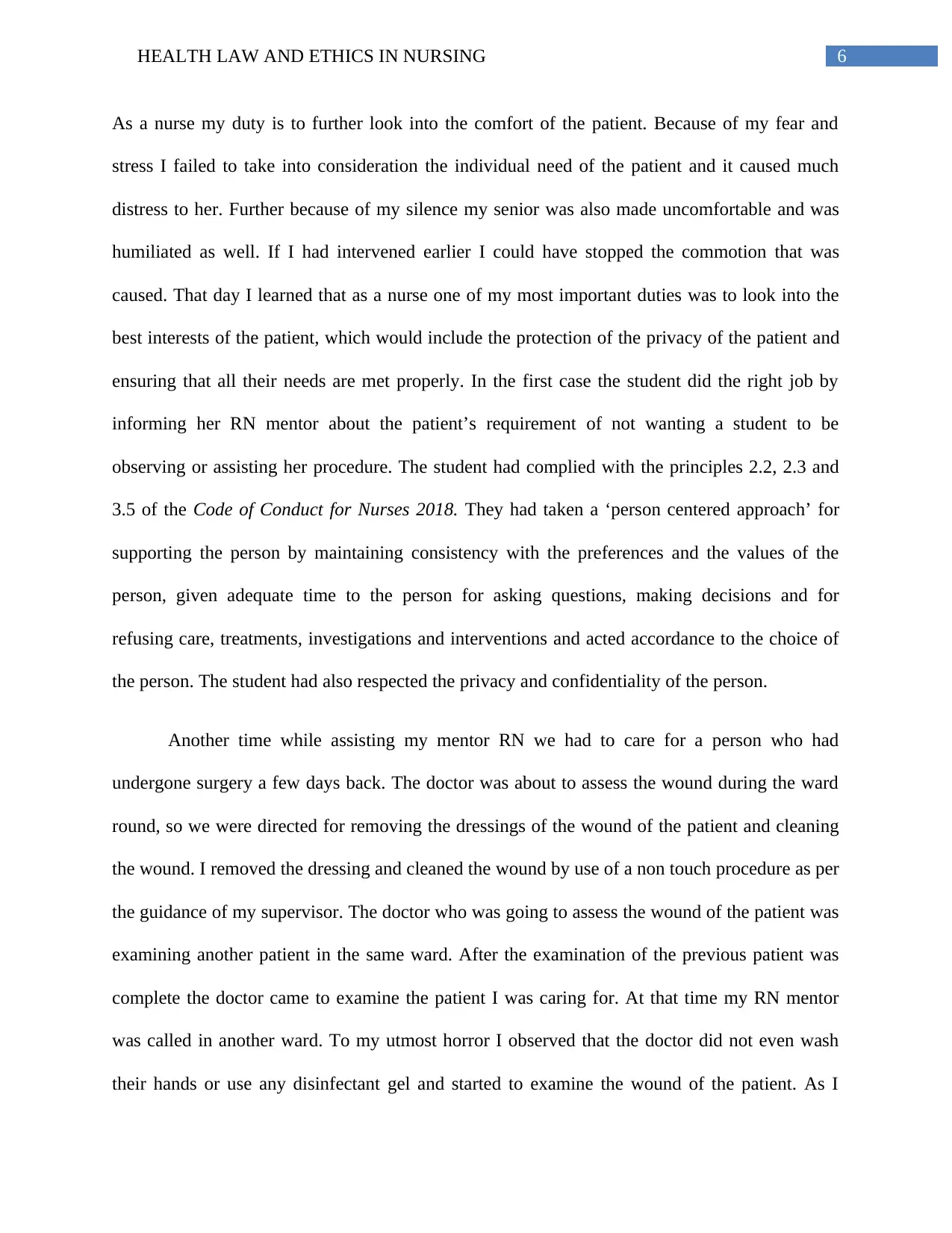
6HEALTH LAW AND ETHICS IN NURSING
As a nurse my duty is to further look into the comfort of the patient. Because of my fear and
stress I failed to take into consideration the individual need of the patient and it caused much
distress to her. Further because of my silence my senior was also made uncomfortable and was
humiliated as well. If I had intervened earlier I could have stopped the commotion that was
caused. That day I learned that as a nurse one of my most important duties was to look into the
best interests of the patient, which would include the protection of the privacy of the patient and
ensuring that all their needs are met properly. In the first case the student did the right job by
informing her RN mentor about the patient’s requirement of not wanting a student to be
observing or assisting her procedure. The student had complied with the principles 2.2, 2.3 and
3.5 of the Code of Conduct for Nurses 2018. They had taken a ‘person centered approach’ for
supporting the person by maintaining consistency with the preferences and the values of the
person, given adequate time to the person for asking questions, making decisions and for
refusing care, treatments, investigations and interventions and acted accordance to the choice of
the person. The student had also respected the privacy and confidentiality of the person.
Another time while assisting my mentor RN we had to care for a person who had
undergone surgery a few days back. The doctor was about to assess the wound during the ward
round, so we were directed for removing the dressings of the wound of the patient and cleaning
the wound. I removed the dressing and cleaned the wound by use of a non touch procedure as per
the guidance of my supervisor. The doctor who was going to assess the wound of the patient was
examining another patient in the same ward. After the examination of the previous patient was
complete the doctor came to examine the patient I was caring for. At that time my RN mentor
was called in another ward. To my utmost horror I observed that the doctor did not even wash
their hands or use any disinfectant gel and started to examine the wound of the patient. As I
As a nurse my duty is to further look into the comfort of the patient. Because of my fear and
stress I failed to take into consideration the individual need of the patient and it caused much
distress to her. Further because of my silence my senior was also made uncomfortable and was
humiliated as well. If I had intervened earlier I could have stopped the commotion that was
caused. That day I learned that as a nurse one of my most important duties was to look into the
best interests of the patient, which would include the protection of the privacy of the patient and
ensuring that all their needs are met properly. In the first case the student did the right job by
informing her RN mentor about the patient’s requirement of not wanting a student to be
observing or assisting her procedure. The student had complied with the principles 2.2, 2.3 and
3.5 of the Code of Conduct for Nurses 2018. They had taken a ‘person centered approach’ for
supporting the person by maintaining consistency with the preferences and the values of the
person, given adequate time to the person for asking questions, making decisions and for
refusing care, treatments, investigations and interventions and acted accordance to the choice of
the person. The student had also respected the privacy and confidentiality of the person.
Another time while assisting my mentor RN we had to care for a person who had
undergone surgery a few days back. The doctor was about to assess the wound during the ward
round, so we were directed for removing the dressings of the wound of the patient and cleaning
the wound. I removed the dressing and cleaned the wound by use of a non touch procedure as per
the guidance of my supervisor. The doctor who was going to assess the wound of the patient was
examining another patient in the same ward. After the examination of the previous patient was
complete the doctor came to examine the patient I was caring for. At that time my RN mentor
was called in another ward. To my utmost horror I observed that the doctor did not even wash
their hands or use any disinfectant gel and started to examine the wound of the patient. As I
Paraphrase This Document
Need a fresh take? Get an instant paraphrase of this document with our AI Paraphraser
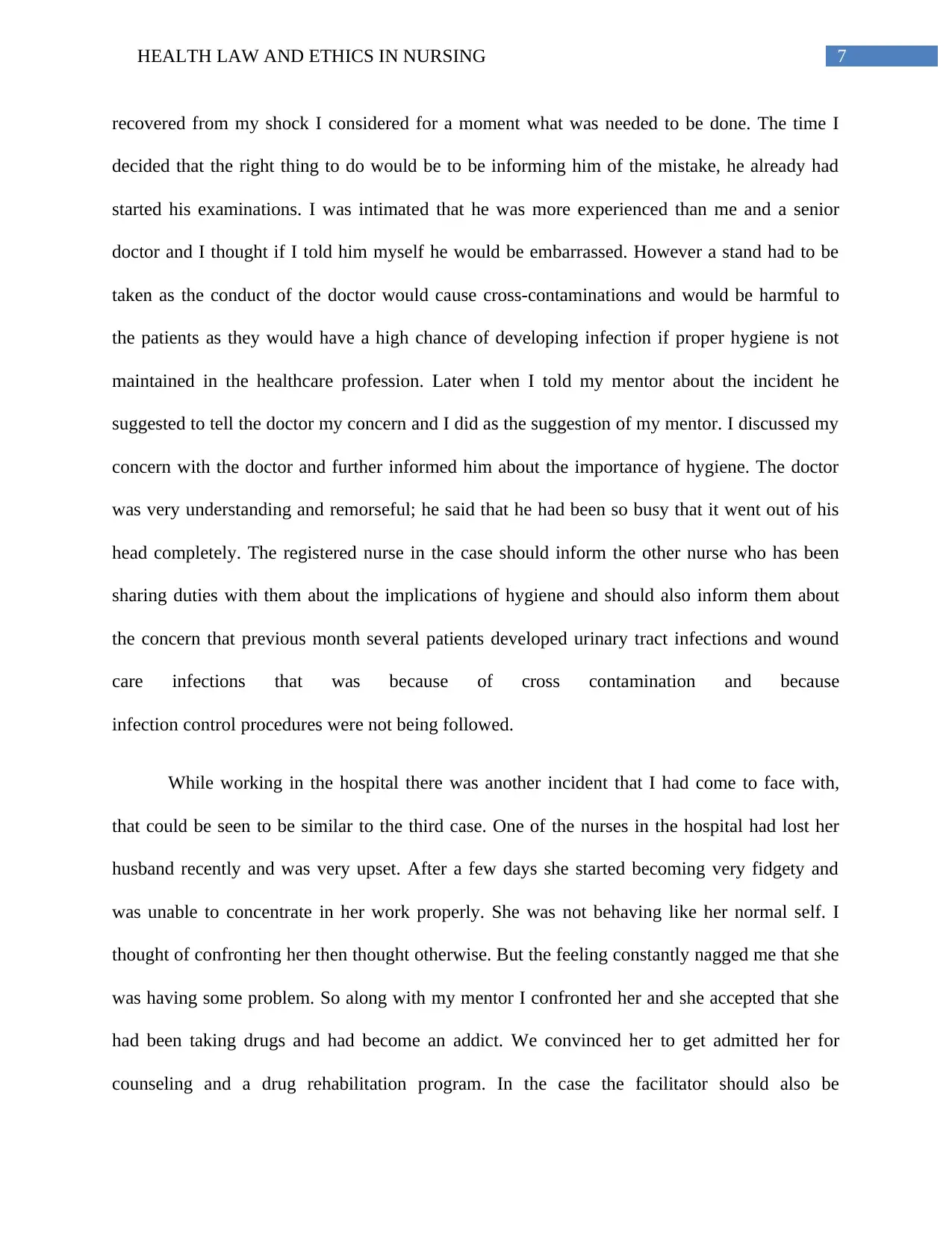
7HEALTH LAW AND ETHICS IN NURSING
recovered from my shock I considered for a moment what was needed to be done. The time I
decided that the right thing to do would be to be informing him of the mistake, he already had
started his examinations. I was intimated that he was more experienced than me and a senior
doctor and I thought if I told him myself he would be embarrassed. However a stand had to be
taken as the conduct of the doctor would cause cross-contaminations and would be harmful to
the patients as they would have a high chance of developing infection if proper hygiene is not
maintained in the healthcare profession. Later when I told my mentor about the incident he
suggested to tell the doctor my concern and I did as the suggestion of my mentor. I discussed my
concern with the doctor and further informed him about the importance of hygiene. The doctor
was very understanding and remorseful; he said that he had been so busy that it went out of his
head completely. The registered nurse in the case should inform the other nurse who has been
sharing duties with them about the implications of hygiene and should also inform them about
the concern that previous month several patients developed urinary tract infections and wound
care infections that was because of cross contamination and because
infection control procedures were not being followed.
While working in the hospital there was another incident that I had come to face with,
that could be seen to be similar to the third case. One of the nurses in the hospital had lost her
husband recently and was very upset. After a few days she started becoming very fidgety and
was unable to concentrate in her work properly. She was not behaving like her normal self. I
thought of confronting her then thought otherwise. But the feeling constantly nagged me that she
was having some problem. So along with my mentor I confronted her and she accepted that she
had been taking drugs and had become an addict. We convinced her to get admitted her for
counseling and a drug rehabilitation program. In the case the facilitator should also be
recovered from my shock I considered for a moment what was needed to be done. The time I
decided that the right thing to do would be to be informing him of the mistake, he already had
started his examinations. I was intimated that he was more experienced than me and a senior
doctor and I thought if I told him myself he would be embarrassed. However a stand had to be
taken as the conduct of the doctor would cause cross-contaminations and would be harmful to
the patients as they would have a high chance of developing infection if proper hygiene is not
maintained in the healthcare profession. Later when I told my mentor about the incident he
suggested to tell the doctor my concern and I did as the suggestion of my mentor. I discussed my
concern with the doctor and further informed him about the importance of hygiene. The doctor
was very understanding and remorseful; he said that he had been so busy that it went out of his
head completely. The registered nurse in the case should inform the other nurse who has been
sharing duties with them about the implications of hygiene and should also inform them about
the concern that previous month several patients developed urinary tract infections and wound
care infections that was because of cross contamination and because
infection control procedures were not being followed.
While working in the hospital there was another incident that I had come to face with,
that could be seen to be similar to the third case. One of the nurses in the hospital had lost her
husband recently and was very upset. After a few days she started becoming very fidgety and
was unable to concentrate in her work properly. She was not behaving like her normal self. I
thought of confronting her then thought otherwise. But the feeling constantly nagged me that she
was having some problem. So along with my mentor I confronted her and she accepted that she
had been taking drugs and had become an addict. We convinced her to get admitted her for
counseling and a drug rehabilitation program. In the case the facilitator should also be
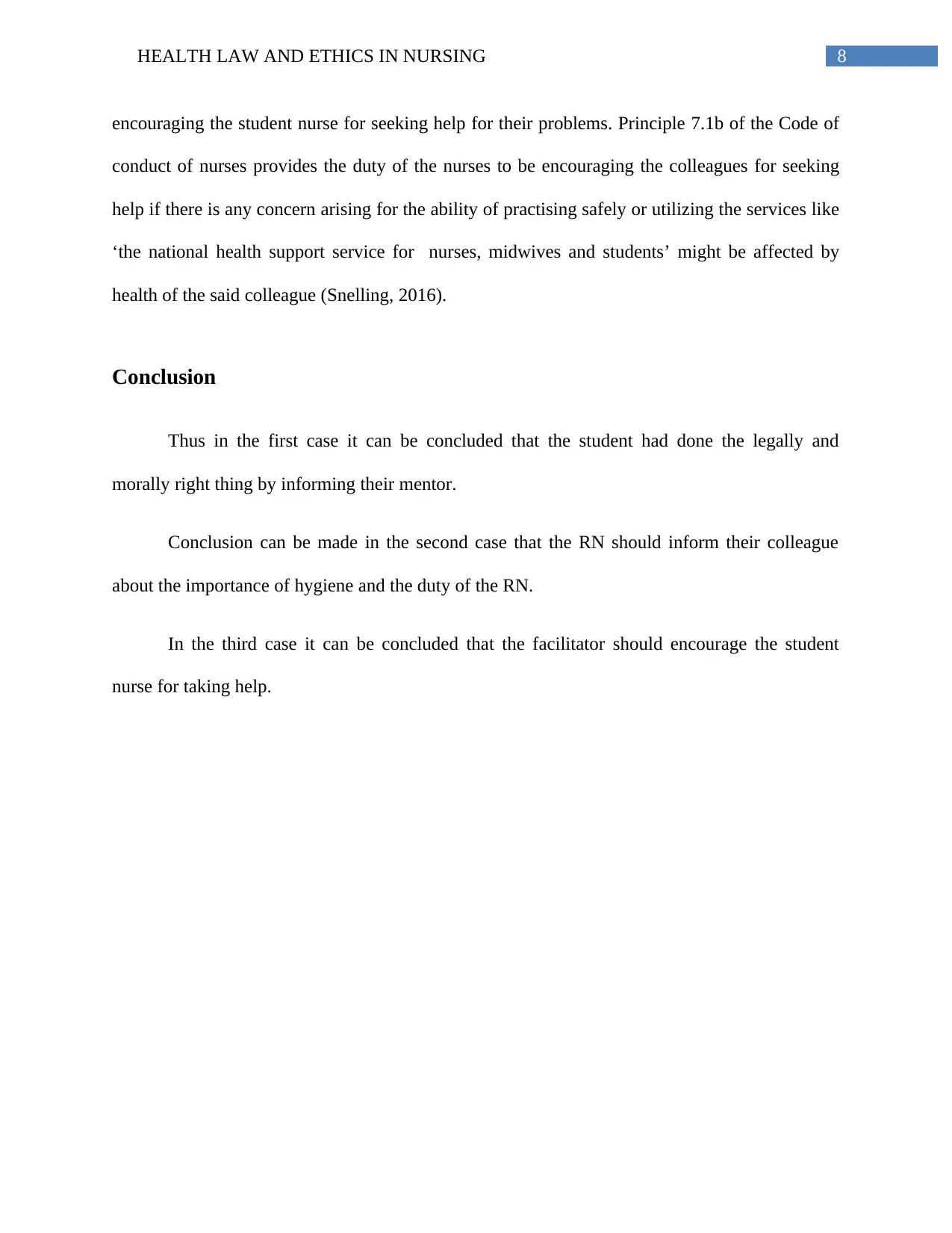
8HEALTH LAW AND ETHICS IN NURSING
encouraging the student nurse for seeking help for their problems. Principle 7.1b of the Code of
conduct of nurses provides the duty of the nurses to be encouraging the colleagues for seeking
help if there is any concern arising for the ability of practising safely or utilizing the services like
‘the national health support service for nurses, midwives and students’ might be affected by
health of the said colleague (Snelling, 2016).
Conclusion
Thus in the first case it can be concluded that the student had done the legally and
morally right thing by informing their mentor.
Conclusion can be made in the second case that the RN should inform their colleague
about the importance of hygiene and the duty of the RN.
In the third case it can be concluded that the facilitator should encourage the student
nurse for taking help.
encouraging the student nurse for seeking help for their problems. Principle 7.1b of the Code of
conduct of nurses provides the duty of the nurses to be encouraging the colleagues for seeking
help if there is any concern arising for the ability of practising safely or utilizing the services like
‘the national health support service for nurses, midwives and students’ might be affected by
health of the said colleague (Snelling, 2016).
Conclusion
Thus in the first case it can be concluded that the student had done the legally and
morally right thing by informing their mentor.
Conclusion can be made in the second case that the RN should inform their colleague
about the importance of hygiene and the duty of the RN.
In the third case it can be concluded that the facilitator should encourage the student
nurse for taking help.
⊘ This is a preview!⊘
Do you want full access?
Subscribe today to unlock all pages.

Trusted by 1+ million students worldwide
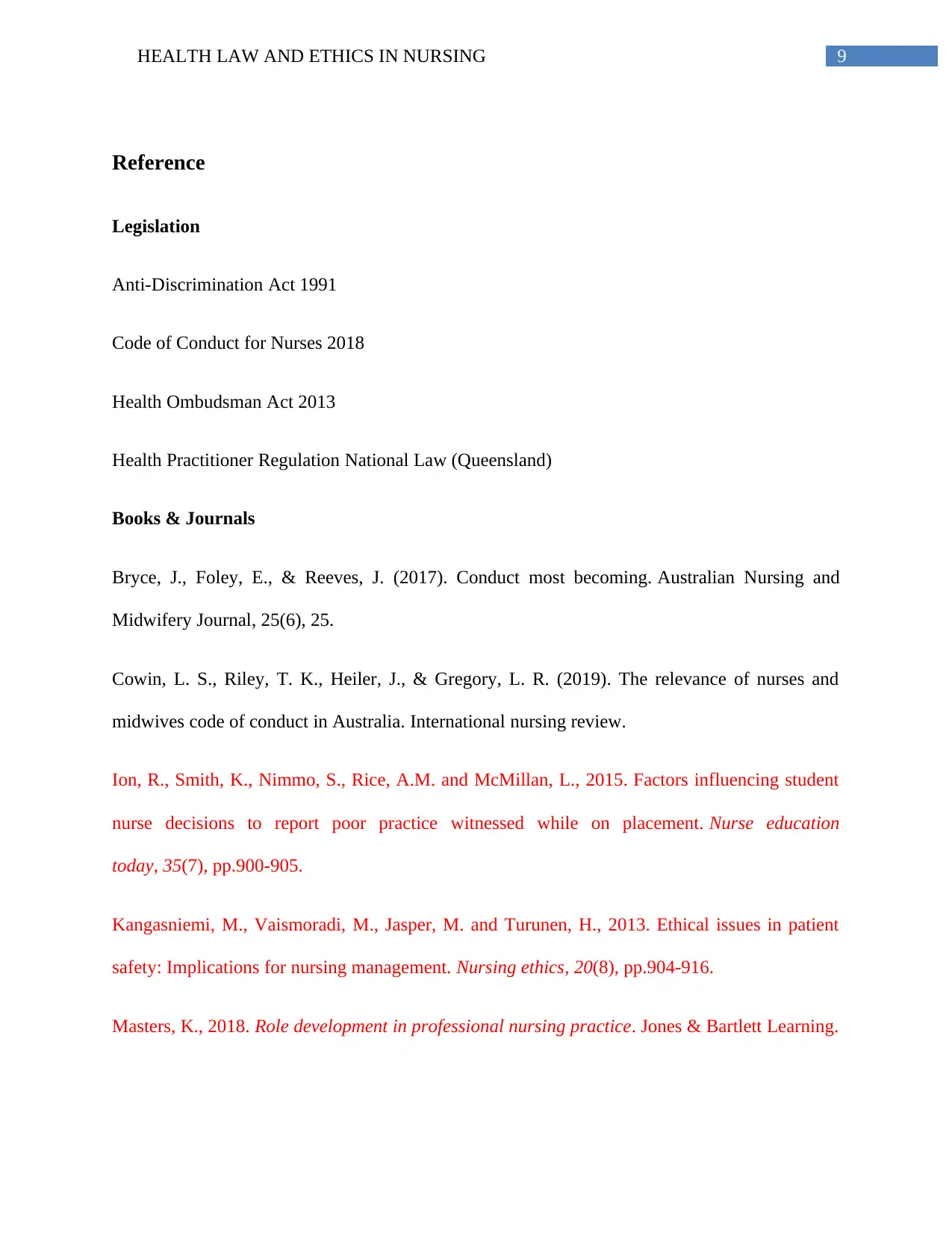
9HEALTH LAW AND ETHICS IN NURSING
Reference
Legislation
Anti-Discrimination Act 1991
Code of Conduct for Nurses 2018
Health Ombudsman Act 2013
Health Practitioner Regulation National Law (Queensland)
Books & Journals
Bryce, J., Foley, E., & Reeves, J. (2017). Conduct most becoming. Australian Nursing and
Midwifery Journal, 25(6), 25.
Cowin, L. S., Riley, T. K., Heiler, J., & Gregory, L. R. (2019). The relevance of nurses and
midwives code of conduct in Australia. International nursing review.
Ion, R., Smith, K., Nimmo, S., Rice, A.M. and McMillan, L., 2015. Factors influencing student
nurse decisions to report poor practice witnessed while on placement. Nurse education
today, 35(7), pp.900-905.
Kangasniemi, M., Vaismoradi, M., Jasper, M. and Turunen, H., 2013. Ethical issues in patient
safety: Implications for nursing management. Nursing ethics, 20(8), pp.904-916.
Masters, K., 2018. Role development in professional nursing practice. Jones & Bartlett Learning.
Reference
Legislation
Anti-Discrimination Act 1991
Code of Conduct for Nurses 2018
Health Ombudsman Act 2013
Health Practitioner Regulation National Law (Queensland)
Books & Journals
Bryce, J., Foley, E., & Reeves, J. (2017). Conduct most becoming. Australian Nursing and
Midwifery Journal, 25(6), 25.
Cowin, L. S., Riley, T. K., Heiler, J., & Gregory, L. R. (2019). The relevance of nurses and
midwives code of conduct in Australia. International nursing review.
Ion, R., Smith, K., Nimmo, S., Rice, A.M. and McMillan, L., 2015. Factors influencing student
nurse decisions to report poor practice witnessed while on placement. Nurse education
today, 35(7), pp.900-905.
Kangasniemi, M., Vaismoradi, M., Jasper, M. and Turunen, H., 2013. Ethical issues in patient
safety: Implications for nursing management. Nursing ethics, 20(8), pp.904-916.
Masters, K., 2018. Role development in professional nursing practice. Jones & Bartlett Learning.
Paraphrase This Document
Need a fresh take? Get an instant paraphrase of this document with our AI Paraphraser
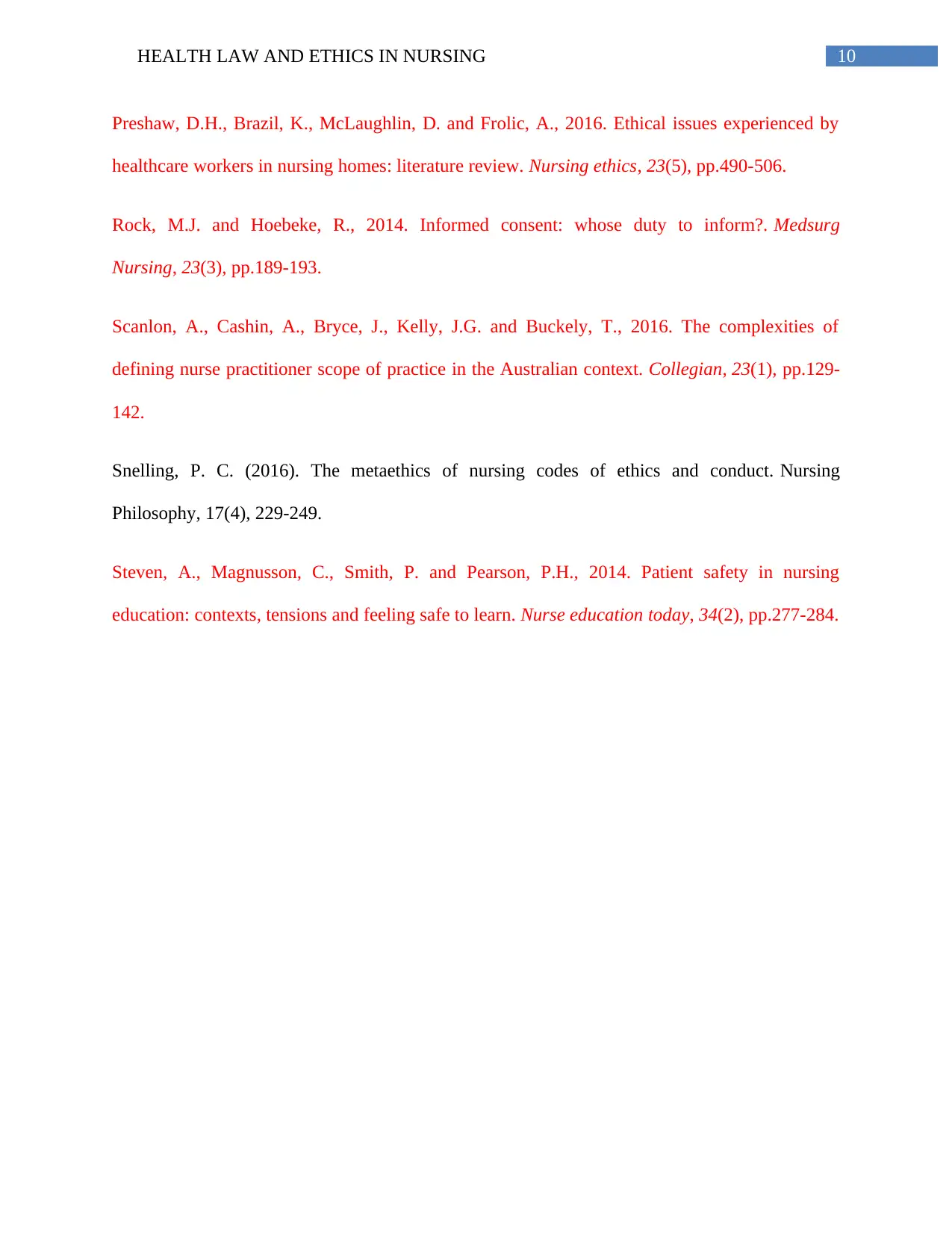
10HEALTH LAW AND ETHICS IN NURSING
Preshaw, D.H., Brazil, K., McLaughlin, D. and Frolic, A., 2016. Ethical issues experienced by
healthcare workers in nursing homes: literature review. Nursing ethics, 23(5), pp.490-506.
Rock, M.J. and Hoebeke, R., 2014. Informed consent: whose duty to inform?. Medsurg
Nursing, 23(3), pp.189-193.
Scanlon, A., Cashin, A., Bryce, J., Kelly, J.G. and Buckely, T., 2016. The complexities of
defining nurse practitioner scope of practice in the Australian context. Collegian, 23(1), pp.129-
142.
Snelling, P. C. (2016). The metaethics of nursing codes of ethics and conduct. Nursing
Philosophy, 17(4), 229-249.
Steven, A., Magnusson, C., Smith, P. and Pearson, P.H., 2014. Patient safety in nursing
education: contexts, tensions and feeling safe to learn. Nurse education today, 34(2), pp.277-284.
Preshaw, D.H., Brazil, K., McLaughlin, D. and Frolic, A., 2016. Ethical issues experienced by
healthcare workers in nursing homes: literature review. Nursing ethics, 23(5), pp.490-506.
Rock, M.J. and Hoebeke, R., 2014. Informed consent: whose duty to inform?. Medsurg
Nursing, 23(3), pp.189-193.
Scanlon, A., Cashin, A., Bryce, J., Kelly, J.G. and Buckely, T., 2016. The complexities of
defining nurse practitioner scope of practice in the Australian context. Collegian, 23(1), pp.129-
142.
Snelling, P. C. (2016). The metaethics of nursing codes of ethics and conduct. Nursing
Philosophy, 17(4), 229-249.
Steven, A., Magnusson, C., Smith, P. and Pearson, P.H., 2014. Patient safety in nursing
education: contexts, tensions and feeling safe to learn. Nurse education today, 34(2), pp.277-284.
1 out of 11
Related Documents
Your All-in-One AI-Powered Toolkit for Academic Success.
+13062052269
info@desklib.com
Available 24*7 on WhatsApp / Email
![[object Object]](/_next/static/media/star-bottom.7253800d.svg)
Unlock your academic potential
Copyright © 2020–2026 A2Z Services. All Rights Reserved. Developed and managed by ZUCOL.




